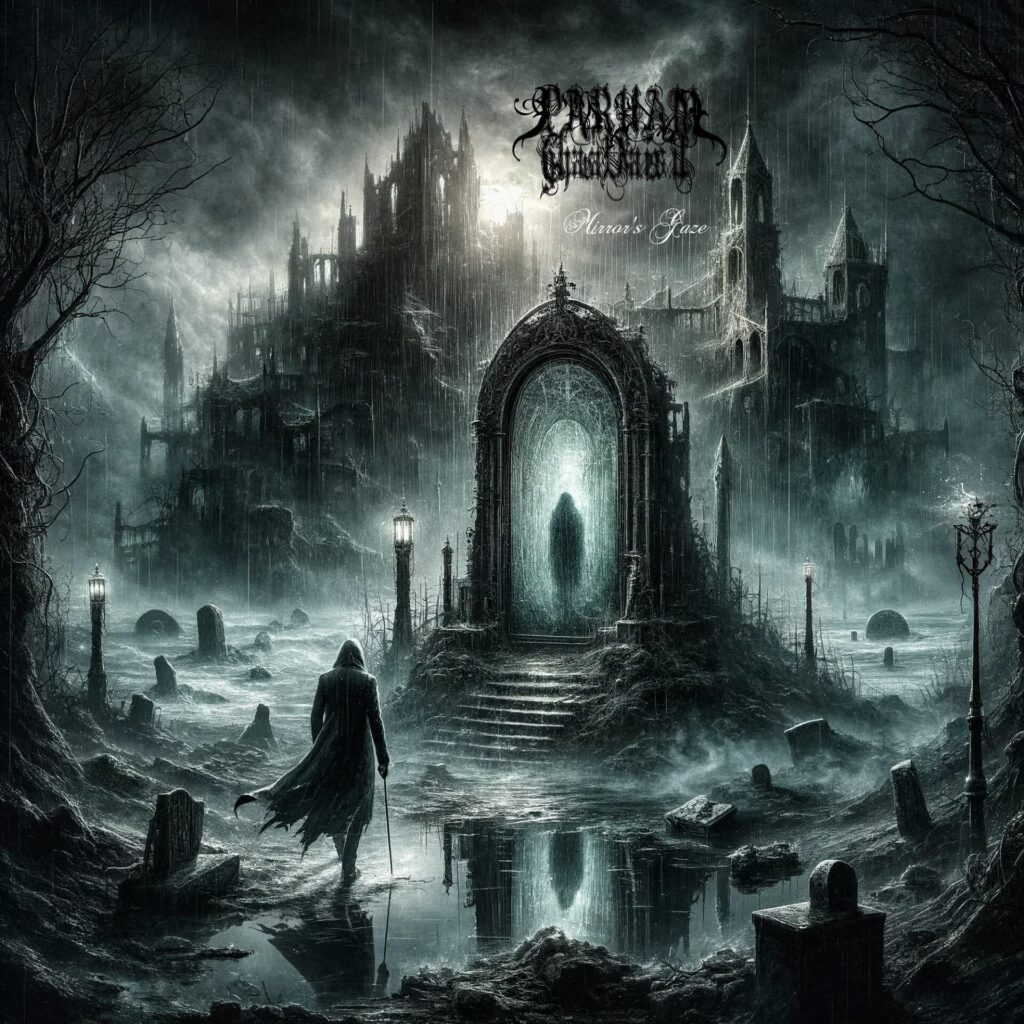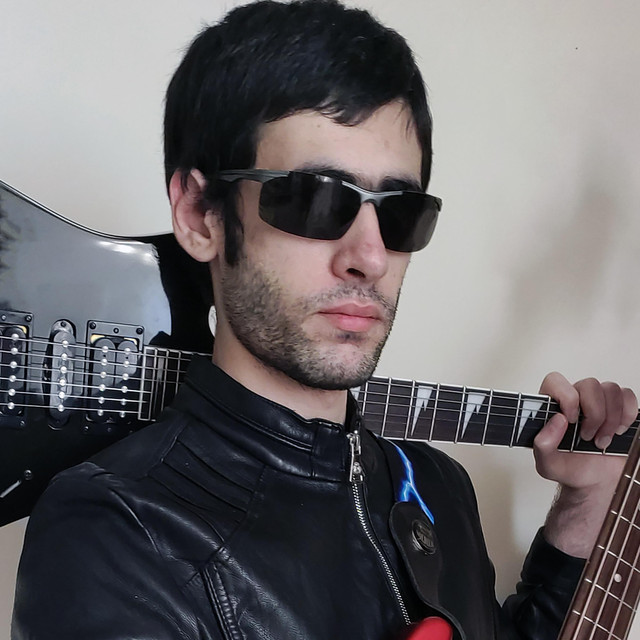With the release of its first album, Identity Cipher, Parham Gharavaisi began as a solo instrumental project. The band quickly adopted a metal sound with the release of its second and third albums, Replicas/Hollow and Resurrection, respectively. Check out the exclusive interview below:
1. Can you tell us a bit about where you come from and how it all got started?
PARHAM GHARAVAISI: Ever since I was a child, I have been fascinated by video games and grew up playing on the old 16-bit consoles such as the SEGA Genesis. Even though the audio functionalities of those old consoles were so primitive, the music in those games still managed to captivate me and has stuck with me to this day. In fact, some of my most favorite records are actual video game original soundtracks. My top three would be Hideyuki Fukasawa’s Chaos Legion OST, Olivier Deriviere’s Alone in the Dark OST, and, of course, Akira Yamaoka’s legendary work on the Silent Hill series. I would write lyrics and compose simple melodies even back then as a child, and even some of my most recent songs have ideas that date back a long time. When I released my debut instrumental post-rock album titled Identity Cipher, I already had plans to transition into the metal genre. I was introduced to the metal genre in the mid-2000s, thanks to video games. Who would’ve guessed? I distinctly remember two metal tracks from Need for Speed Most Wanted’s Soundtrack: Disturbed’s Decadence and Bullet for My Valentine’s Hand of Blood, both of which remain my favorites to this day.
2. Did you have any formal training or are you self-taught?
PARHAM GHARAVAISI: I had never taken any formal training or classes, except for some piano lessons as a child that I can’t remember anything about anymore since I don’t play the piano now, just the guitar and the bass. Everything I know about music and audio production is completely self-taught, from both clean and screamed vocals to playing the guitar to recording, mixing, and mastering. Whether having taken classes could have expedited the process is something I’m not entirely sure about. If anything, I think it could’ve actually been detrimental to my progress personally, but I could be wrong.
3. Who were your first and strongest musical influences and why the name ‘PARHAM GHARAVAISI?
PARHAM GHARAVAISI: Let me start with the second question first. It seems like every combination of words from the entire dictionary is already taken as a band name fifty times over; even misspelled words are existing band names, it’s unbelievable! So, I just decided to go with my real name instead, especially since it’s a solo musical project in the first place. Now, to the difficult question, it’s hard to say other than pointing out that video game soundtracks were my first experience with music in general. My songs span across so many vastly different genres that it’s hard to pinpoint exactly what idea came from where. For instance, I have orchestral pieces and death metal with brutal screams on the same album. However, I am consciously aware of certain musical motifs that I truly love and would use in any opportunity I get, and the majority of those are from video game soundtracks. When it comes to metal, I just absolutely adore the atmosphere and general soundscape of mid-2000s melodic metalcore and gothic metal music.
4. What do you feel are the key elements in your music that should resonate with listeners, and how would you personally describe your sound?
PARHAM GHARAVAISI: I think when it comes to music, particularly the music that I make, the message is key and should take precedence over everything else. Allow me to explain. While the lyrics often carry the message, this is not always the case, nor are they the only vehicle. Sometimes, a guitar solo can convey so much emotion that it surpasses an entire page of lyrics. Other times, a bassline tucked in the background can have a massive emotional impact without even being the focus of the listener. More often than not, the burden falls on the shoulders of the lyrics and the accompanying vocals. With all that being said, I believe every song must exist for a purpose; it must have something to say or an important idea to convey. I pour my heart and soul into writing the lyrics as well as the song, and I can only hope to present some food for thought to my audience.
5. Do you think is it important for fans of your music to understand the real story and message driving each of your songs, or do you think everyone should be free to interpret your songs in their own personal way?
PARHAM GHARAVAISI: I think both aspects are crucial when analyzing literature in general, not just musical lyrics. To disregard either the author’s intent or the reader’s interpretation would be unwise. We can endlessly debate which is more important, but it’s more productive to focus on the meaning derived from each interpretation. Personally, while I welcome listeners’ takes on my lyrics and encourage them to reach their own conclusions, I have a very specific message in mind for each song and appreciate it being deciphered and understood. Lyrics are not an afterthought for me; they are the focus of my songs. I would like my audience to try to understand what I meant and why I said the words that I did. They are free to disagree or debate, but I hope they consider my points and attempt to see the world from my point of view as well.
6. What’s your view on the role and function of music as political, cultural, spiritual, and/or social vehicles – and do you try and affront any of these themes in your work, or are you purely interested in music as an expression of technical artistry, personal narrative, and entertainment?
PARHAM GHARAVAISI: While sociopolitical commentary has always been a major theme in my songs, I have an upcoming album titled Ghosts of Nations, scheduled for release on October 14, 2024, that is entirely dedicated to just that. This album fully commits to and delves deep into mature themes such as societal collapse, self-harm and suicide, grief and loss, mass shootings, domestic abuse, and internal conflict, among other sensitive subjects, in a manner that I hope will be considered tasteful. I realize not everyone will agree with my point of view, but that is the nature of life, and I will stand by my beliefs regardless. One critical fact I need to point out is that authors in general do not always write to convey their personal beliefs, and I am no exception. Just because I say something in a song does not necessarily mean that I agree with or endorse it. Authors are storytellers, and sometimes we just like to tell a good story, that’s all. However, when it comes to Ghosts of Nations specifically, I stand by the points I’ve made herein for the most part, even though I can’t say the same for my previous work. I hope that clears things up!
7. Do you feel that your music is giving you back just as much fulfillment as the amount of work you are putting into it or are you expecting something more, or different in the future?
PARHAM GHARAVAISI: That would be hard for me to say; I make music for myself and create songs that I personally want to listen to, so I guess I haven’t given it much thought. When it comes to expectations, my only hope, I guess, is the same as any other author’s: to provide something of value to the audience. I can only hope that my lyrics will make people think and consider opposing views instead of dismissing them outright and seeing everyone who disagrees with them as enemies. We need to try harder to reach middle ground and understand each other as humans. In general, I feel like I’m taking a step towards that when I’m writing lyrics. So, in a sense, my biggest expectation is to be understood.
8. Could you describe your creative processes? How do usually start, and go about shaping ideas into a completed song? Do you usually start with a tune, a beat, or a narrative in your head? And do you collaborate with others in this process?
PARHAM GHARAVAISI: My typical approach to music production begins with crafting riffs and chord progressions on a classical guitar. This method proves to be the most convenient for me., regardless of the genre I’m working in. After I’m happy with the basic structure, I start the recording process with the rhythm guitars, followed by programming the drums. Then, I lay down the lead guitar tracks and the bass. The next phase involves writing or finalizing the lyrics and recording the vocals. To complete the track, I add in the synth and atmospheric elements. Once a song is complete, I generally don’t revisit or alter it; I consider it finished and move on to creating the next piece.
9. Creative work in a studio or home environment, or interaction with a live audience? Which of these two options excites you most, and why?
PARHAM GHARAVAISI: Hands down, working in my home studio, without a shadow of a doubt. I find it’s where I have the most freedom to explore ideas at my own pace and focus on creating more songs and writing more lyrics.
10. With social media having a heavy impact on our lives and the music business in general, how do you handle criticism, haters, and/or naysayers in general? Is it something you pay attention to, or simply ignore?
PARHAM GHARAVAISI: I don’t have social media and don’t use it at all. I have an old Twitter, now X, account that I created a long time ago just to log in to mobile games, and now I post new songs on it, but other than that, I don’t really use it. I also rarely, if ever, read comments, so I wouldn’t really know. However, I do respond as quickly as I can whenever someone reaches out to me directly. So here’s my message to my audience: If you have something to say to me or there’s something you want to talk about, message me directly on either Telegram or Twitter (X) @dark_reav3r.
KEEP IN TOUCH:
TWITTER | SPOTIFY | BANDCAMP | YOUTUBE


